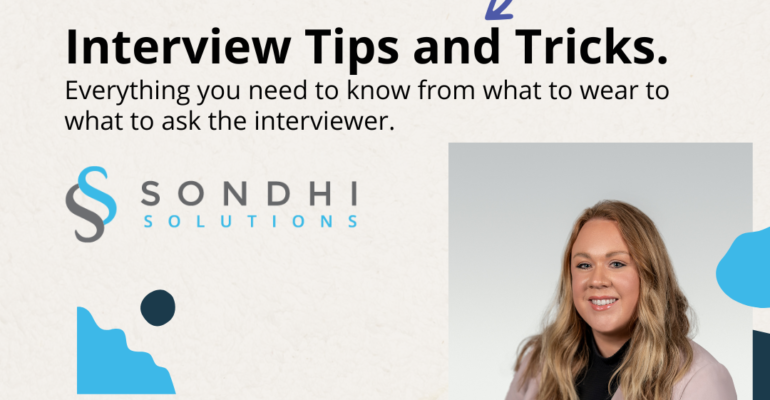Interview Tips and Tricks

Interview Tips and Tricks
Tips To Have A Better Conversation
An interview is more about what you bring to the table in experience and certifications, it is also an evaluation of your interpersonal skills that show the interviewer how you will engage with your team and coworkers. The interviewer will examine your confidence, the way you pose yourself with difficult questions, how well you communicate, and your body language. Keep in the mind the following tips before entering an interview.
·Don’t multitask
·Don’t pontificate
·Use open ended questions
·Go with the flow
·Say what you don’t know
·Don’t equate your experience with theirs
·Don’t pontificate
·Listen
·Go with the flow
·Say what you don’t know
·Don’t equate your experience with theirs
·Try not to repeat yourself
·Stay out of the weeds
·Be brief and interested in other people
Interview Questions You’ll Be Asked

You don’t need to memorize an answer, but do take the time to consider how you’ll respond. The more you prepare, the more confident you’ll feel during a job interview.
Questions About Yourself
In this portion, interviewers are trying to learn more about you. What is your work ethic like, and how do you handle challenges. As well as getting to know you on a personal level. What do you like to do in your free time or what are your hobbies. This is your opportunity to share aspects about yourself that they may not know just by looking at your resume.
·Tell me about yourself.
·What is your greatest weakness?
·How do you handle stress and pressure?
·Describe your work style.
·What motivates you?
·What are your passions?
·Tell me about something that’s not on your resume.
·How do you handle failure?
·Do you work well with other people?
·What are your hobbies?
·Are you a self-motivator?
·How does this job fit in with your career aspirations?
·How are you different from the competition?
·Would you rather be liked or respected?
Questions About Leaving Current Role
Interviewers are trying to understand why you are leaving your current role, including if it is voluntary. This is your opportunity to speak to what motivates you and gives the interviewer more insight into how you will fit into the role. It is best to be straightforward and gear your responses to your future with the new company.
·Why are you leaving your job?
·Why the change?
·Why did you resign?
·Why have you been unemployed?
Questions On The Future
Here interviewers want to know what your plans are. Are you looking for a specific career path, what certifications will you achieve to accomplish your goals? They want to know what your aspirations are, and long-term career goals are.
·What is your development plan?
·Why are you looking for a new position?
·How do you plan to achieve your goals?
Questions On Management and Teamwork
This is where you get to share your work style, are you team-oriented? How do you handle problems with coworkers? This is a great way to show not only how you address problems but how you solve them too. Showcasing great problem-solving skills will demonstrate your resilience.
·Describe your ideal boss?
·Give some examples of teamwork?
·Describe how managed a problem employee?
Questions About Salary
Talking about salary is important to make sure you and your potential employer are on the same page. If you are unsure of what salary you are looking for doing some research on the average salary for a role including your qualifications and years of experience can give you a good idea of what your requirements could be.
·What was your final compensation?
·What are your salary requirements?
·Why would you take a job for less money?
Questions On Qualifications
Here is the time where you can shine and demonstrate why you are qualified. It is important to show employers how you stand out from other candidates and what you bring to the table. It is good to acknowledge what challenges you and how you overcome those challenges.
·How did you impact the bottom line?
·What applicable experience do you have?
·What you do better for us than other candidates?
·What strength will help you most succeed?
·What part of the job will be least/most challenging?
·Why philosophy guides your work?
Job Performance Questions
Here interviewers want to see how you perform in a role. Maybe you thrive in a busier environment or a quieter workspace. How well do you adapt to different situations. Sharing how you deal with a heavy workload can give insight if you are a good fit for the potential job.
·What type of work environment do you prefer?
·How do you evaluate success?
·Describe a time your workload was heavy and how you handled it?
Questions On The New Company
One of the most important things in an interview is demonstrating what you know about the company. Doing your research to learn about what they do, their values, and ongoing initiatives shows you have put in the effort to get to know them. When looking at the job description take note of what stands out to you. What are you eager to learn or get better at? What do you want to accomplish in your first 30-days? This will give you a good idea of what to expect and look forward to.
·Why do you want this job?
·What is your ideal company culture?
·What challenges are you looking for in this position?
·How do you picture the first 30 days?
Questions Employers Should Not Ask
Federal and state laws prohibit prospective employers from asking certain questions that are not related to the job they are hiring for. Employers should not ask about any of the following unless it specifically relates to the job requirements because to not hire a candidate because of any one of them is discriminatory:
·Race
·Color
·Sex
·Religion
·National origin
·Birthplace
·Age
·Disability
·Marital/family status
·Salary (some locations)
Job requirements based on an employee’s gender, national origin, religion, or age can be used in very limited circumstances. They are lawful only when an employer can demonstrate that they are bona fide occupational qualifications (BFOQs) that are reasonably necessary to the normal operation of a business. For example, it’s acceptable to require the candidate to be a Roman Catholic for a job as director of the faith formation for a Catholic parish.
How Should You Respond
If you are asked an illegal interview question or the questions begin to follow an illegal trend, you always have the option to end the interview or refuse to answer the question. It may be uncomfortable to do, but you need to be comfortable working at the company. If the questions you are being asked during the interview are indicative of the company’s policies, you may be better off finding out now.
Sometimes an interviewer will ask inappropriate questions accidentally, and in that case, you may choose to answer them politely, avoiding the substance of the question but addressing the intent.
Questions To Ask An Interviewer
It’s your turn! As your job interview comes to a close, one of the final questions you may be asked is, “What can I answer for you?” Your interviewer will expect you to have some questions.

Not asking any questions could make you seem unprepared or disinterested, so take the time to have some questions of your own ready to ask the hiring manager.
Topics To Think About:
Duties and Requirements
Here is it good to get an idea of what your workload may look like and what tasks you will regularly be assigned.
How would you describe a typical workday?
Office Structure
Asking this is a great way to learn how you will do with the leadership style of the company and give you good insight if both you and the potential employer are a good fit.
What is the company’s management style?
Culture
It is good to know why people enjoy their roles and working for their company, so asking this can give you more insight as to why the role and company could be a great fit for you.
What are the biggest rewards of the job and working for this company?
Promotion
Asking this is a good way to know how you will progress in your career and what growth opportunities exsist at the company.
What are the prospects for growth and advancement?
Mission and Vision
Learning about the mission and vision of a company is a great way to see where they are headed. If this aligns with your personal vision, you could be a good fit!
How has the company changed over the last few years?
Questions To Ask
You might be unsure of what questions to ask but these could be a good start. These will help you learn the logistics, how you can advance, and learn more about the company overall.
·How much travel is expected?
·Would you like a list of references?
·How does one advance at the company?
·How many people work in the office?
·Why is this job available? Is there a new position? If not, what did the previous employee go on to do?
·How would you describe the company’s values?
Questions Not To Ask
Now that we have gone over what to ask, it is good to know what NOT to ask. It is good practice to do research on the company beforehand to show your interest in them. You might be looking to take a vacation but waiting until after an offer is made would be a better time to ask questions related to that. Finally, although you might be eager in anticipation of knowing whether you got the role or not it is good practice to wait at least a week from the final interview to follow up on the status of the role.
·What does your company do? (research ahead of time)
·If I get the job, when can I take time off for vacation? (wait until the offer)
·Can I change my schedule if I get the job? (don’t mention logistics right now)
·Did I get the Job? (be patient)
Guidelines For Asking Questions
While you don’t have to ask every question on the list above, having a few good questions ready will help you look like an informed and prepared candidate for the job. Here are some other things to keep in mind when preparing your own list of questions.
Avoid “Me” Questions: “Me” questions are those that put yourself ahead of the employer. These include questions about salary, health insurance, vacation time, work hours per week, and other concessions. During an interview, you are trying to demonstrate to the employer how you can benefit the company, not the other way around. Once you are offered a position, you can begin to ask what the company can do for you.
Ask One Question at a Time: Avoid multi-part questions; they will only overwhelm the employer. Each question should have one specific point.
Avoid “Yes” or “No” Questions: Most questions with a “yes,” “no,” or another one-word answer could likely be answered by searching the company’s website. Stick to questions that will create a dialogue between yourself and the employer.
Ask Questions About Multiple Topics: Avoid asking questions about just one subject. For example, if you only ask questions about your manager and his managerial style, the interviewer may assume you have an issue with authority figures. Ask questions about a variety of topics to demonstrate your curiosity and interest in all aspects of the position.
Don’t Ask Anything Too Personal: While it is a good idea to try to establish a rapport with your interviewer, do not ask personal questions that are not public information. For example, if you see a college banner on the employer’s wall, you can certainly ask if he went to that college. Avoid overly personal questions about the interviewer’s family, race, gender, etc.
Work-From-Home Interview Questions

Work-from-home has been widely common since the start of the pandemic so many roles are remote or hybrid. Asking these questions lets you know what to expect for remote work.
·Do I need to purchase any office equipment?
·Are there set work hours or is the schedule flexible?
·Is training provided?
·Are there any fees for coming on board with this company?
What To Wear For An Interview

You always want to dress to make the best impression, but the outfit you choose depends on whether you’re interviewing at a company with a formal dress code, at a casual startup, or for an informal summer job or internship.
Outfits For Women
·Navy blue blazer to endless options
·Button down shirts, tucked-in
·Menswear with a khaki mix and match suit
·Black dress below the knee with tights
·Sweater and Black dress pants
·Less is more with accessories
Outfits For Men
·A sweater and button-down shirt
·Light colored jacket and pants
·Blue blazer and slacks
·Gray suit, with a colorful button-down shirt
and sweater underneath
What Not To Wear
·Bright, flashy colors
·Deep v necklines
·Overly casual clothes
·Dated fashions
·Heavy perfume
What Not To Wear
·Piles of makeup
·Wacky or novelty ties
·Excessive accessories
·Headphones
·Heavy cologne

